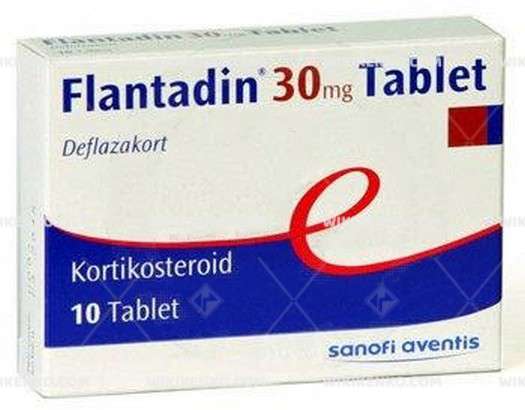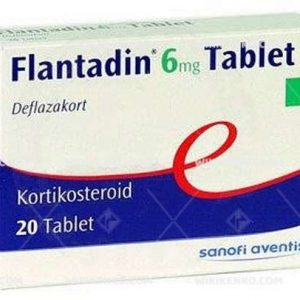Flantadin Tablet 30 Mg
Flantadin 30 mg tablet, this round, white, uncoated tablet, marked with a cross on one side and “30” on the other, contains 30 mg of the active ingredient deflazacort. With its anti-inflammatory properties, it provides relief from a variety of health problems caused by inflammation. This article will delve into the general information, uses, and potential side effects of it, highlighting its effectiveness as a treatment option.
| Dosage form | |
|---|---|
| Pack size | |
| Potency | 30 Mg |
| Manufacturer | |
| Origin | |
| Generic Name (Ingredient) | Deflazakort 30 Mg |
Assuming your emergency circumstances for this product, visit Urgent Quotation page. Besides, for any pharmaceutical questions, please ask us in the comments section.
Description
General Information
Flantadin 30 mg tablet comes in blister packs containing 10 tablets. Each tablet contains 30 mg of deflazacort, a synthetic corticosteroid that mimics the natural corticosteroids found in the body. Corticosteroids play a crucial role in maintaining overall health. By introducing external corticosteroids like it, medical professionals effectively address diseases that trigger inflammation within the body. it specifically targets and reduces inflammation, thereby alleviating associated health issues.
Flantadin’s Versatile Uses
Flantadin has been prescribed by doctors for various reasons due to its effectiveness in treating inflammatory conditions. Some of the conditions for which Flantadin may be prescribed include:
Treatment of severe allergic responses, hypersensitivity reactions (anaphylaxis), and asthma: Flantadin aids in managing these conditions by addressing the inflammation that leads to breathing difficulties caused by the narrowing of the airways in the lungs.
Treatment of rheumatic diseases: it is commonly used in the treatment of rheumatoid arthritis, juvenile chronic arthritis, and polymyalgia rheumatica, providing relief from inflammation and associated symptoms.
Treatment of connective tissue diseases: Flantadin effectively manages connective tissue diseases, including systemic lupus erythematosus, dermatomyositis, and mixed connective tissue disease (except systemic sclerosis). By reducing inflammation, it helps alleviate disorders affecting the skin, kidneys, heart, digestive system, and eyes.
Treatment of skin diseases: Flantadin has been proven effective in treating skin conditions such as pemphigus, bullous pemphigoid, and pyoderma gangrenosum by reducing inflammation and promoting healing.
Treatment of nephrotic syndrome: it helps manage this kidney disease, which causes swelling (edema) in the legs and eyelids due to excessive protein loss through the kidneys.
Treatment of rheumatic carditis: Flantadin plays a vital role in treating inflammatory heart diseases like rheumatic carditis, reducing inflammation and minimizing the associated symptoms.
Treatment of inflammatory diseases of the intestines and digestive tract: ist is an effective option for managing ulcerative colitis and Crohn’s disease, reducing inflammation and providing relief from associated digestive issues.
Treatment of eye diseases: Flantadin is used to treat uveitis and optic neuritis, two inflammatory eye conditions that can cause discomfort and vision problems.
Treatment of blood diseases and cancers: Flantadin is also prescribed for various blood diseases, such as autoimmune hemolytic anemia and idiopathic thrombocytopenic purpura. Additionally, it is used in the treatment of blood cancer and other tumors, including acute and lymphatic leukemia, malignant lymphoma, and multiple myeloma.
Immunosuppression in transplantation: it aids in suppressing the immune system’s response against transplanted organs, ensuring a successful transplantation.
| Condition | Details |
|---|---|
| Allergies, asthma | Alleviates symptoms like airway narrowing |
| Arthritis | Helps manage symptoms and improve quality of life |
| Connective tissue diseases | Addresses inflammation in conditions like lupus |
| Transplant immunosuppression | Suppresses immune rejection of transplanted organs |
Potential Side Effects
As with any medication, Flantadin can cause side effects in individuals who are sensitive to its components. It is important to be aware of these potential side effects, which may include:
Weight gain: Commonly reported among users, weight gain may occur as a side effect of Flantadin.
Increased susceptibility to infections: In some cases, it may increase the risk of developing infections.
Opportunistic infections and recurrence of silent tuberculosis: Flantadin’s suppression of clinical symptoms and signs can lead to opportunistic infections and the reactivation of latent tuberculosis.
Severe and fatal hypersensitivity reactions: Although rare, there have been reports of severe allergic reactions, including anaphylaxis, which can manifest as swelling of the hands, feet, ankles, face, lips, or throat. These reactions may also include a raised, red, and itchy rash on the skin.
When to Seek Medical Attention
Certain symptoms require immediate medical attention or even hospitalization. If you experience any of the following while taking Flantadin, discontinue its use and promptly consult your doctor or visit the emergency department:
Hypersensitivity reactions, including anaphylaxis: If you notice swelling of the hands, feet, ankles, face, lips, or throat, making it difficult to swallow or breathe, along with a raised, red, and itchy rash (hives), seek medical assistance immediately.
Gastrointestinal complications: Black tar-like stool or the presence of fresh or clotted blood in the stool, along with vomiting that resembles coffee grounds, may indicate stomach ulceration and require urgent medical attention.
Severe stomach pains radiating to the back: Intense abdominal pain that reaches the back may be a sign of pancreatitis, necessitating immediate medical evaluation.
Conclusion
Flantadin 30 mg tablet is a valuable treatment option for various inflammatory conditions. Its active ingredient, deflazacort, effectively reduces inflammation and provides relief from associated symptoms. From managing allergic responses and rheumatic diseases to treating skin conditions and suppressing immune responses in transplant patients, it plays a vital role in promoting overall health.
However, it is essential to be aware of potential side effects and seek immediate medical attention when necessary. Consult your doctor to determine if it is the right choice for your specific medical needs.
Use the form below to report an error
Please answer the questions as thoroughly and accurately as possible. Your answers will help us better understand what kind of mistakes happen, why and where they happen, and in the end the purpose is to build a better archive to guide researchers and professionals around the world.
The information on this page is not intended to be a substitute for professional medical advice, diagnosis, or treatment. always seek the advice for your physician or another qualified health provider with any questions you may have regarding a medical condition. Always remember to
- Ask your own doctor for medical advice.
- Names, brands, and dosage may differ between countries.
- When not feeling well, or experiencing side effects always contact your own doctor.
Cyberchondria
The truth is that when we’re sick, or worried about getting sick, the internet won’t help.
According to Wikipedia, cyberchondria is a mental disorder consisting in the desire to independently make a diagnosis based on the symptoms of diseases described on Internet sites.
Why you can't look for symptoms on the Internet
If diagnoses could be made simply from a textbook or an article on a website, we would all be doctors and treat ourselves. Nothing can replace the experience and knowledge of specially trained people. As in any field, in medicine there are unscrupulous specialists, differences of opinion, inaccurate diagnoses and incorrect test results.




Reviews
There are no reviews yet.